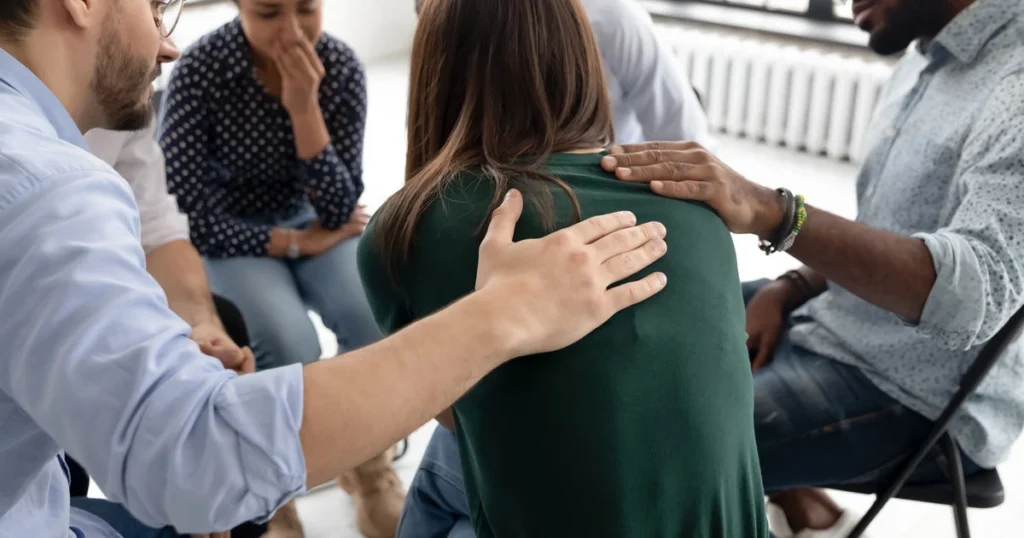Feeling stuck on your path to recovery? Well, you’re not alone. For those, grappling with substance use disorder who find themselves facing similar challenges, searching for effective ways to foster healing and growth, this blog is here to help! In this blog, we’ll delve into a range of dynamic and supportive group therapy activities designed specifically for those in recovery from substance use. So, let’s dive in and explore these transformative activities together!
Contents
What is the Purpose of Group Therapy in Addiction Recovery?
Group therapy is really valuable in addiction recovery because it lets everyone support each other and share their experiences. It’s like having a team where everyone understands what you’re going through. This kind of therapy helps people learn from each other and feel less alone in their challenges. It also builds important social skills and gives everyone a variety of ways to handle tough situations. Being part of such a supportive group can really boost your confidence and keep you on track with your recovery journey.
What Skills Can Be Developed Through Group Therapy Activities?
 Group therapy activities for substance use disorder recovery help develop a range of practical skills:
Group therapy activities for substance use disorder recovery help develop a range of practical skills:
- Communication Skills: Participants improve how they talk about their addiction experiences, enhancing openness and mutual support.
- Emotional Regulation: Managing emotions effectively is crucial for resisting urges to use substances under stress.
- Conflict Resolution: Learning to handle conflicts can help mend relationships damaged by substance use.
- Problem-Solving Skills: Group therapy often involves activities that boost one’s ability to identify problems and think through potential solutions.
- Self-awareness: Through feedback and discussions, participants gain insights into their behaviors and triggers, which is vital for personal growth and recovery.
Remember, these skills are key not only for recovery but also for thriving in daily life.
Activities Used in Group Therapy for Substance Use?

Group therapy for addiction recovery includes a variety of engaging and therapeutic activities:
Building Trust Through Icebreakers
Icebreakers are essential in group therapy for addiction as they help create a safe and welcoming environment. Activities like “Two Truths and a Lie” or simple introductory rounds allow participants to share fun and personal information in a light-hearted manner. This helps break down barriers, making individuals more comfortable with sharing deeper, more personal experiences later on. Such activities foster a sense of community and trust, which is crucial for effective therapy and recovery.
Expressive Arts as a Therapeutic Tool
In group therapy for addiction, expressive arts like drawing, music, and drama play a crucial role. These activities allow individuals to express emotions without words, helping to enhance self-awareness and promote healing.
For instance, drawing can be used to visually represent feelings and experiences, music might be employed to explore and regulate emotions, and drama can help participants act out situations to gain new perspectives. Each of these activities encourages creativity and emotional expression, essential components in the recovery journey.
Role-Playing for Conflict Resolution
Role-playing in group therapy provides a dynamic way to develop communication skills and understand different perspectives. By acting out scenarios, participants practice resolving conflicts and responding to challenging social interactions in a controlled, supportive setting. This method allows individuals to experiment with different approaches, receive feedback, and refine their interpersonal skills, which are crucial for personal and professional relationships outside the therapy room.
Group discussions in therapy are guided by facilitators who focus on topics relevant to addiction and recovery. These discussions allow participants to share their personal stories and challenges, fostering a deeper understanding and connection among group members. The therapeutic value of these interactions lies in the mutual support and validation that members provide to each other, which reinforces the recovery process and enhances the sense of community within the group.
Mindfulness and Relaxation Techniques
Mindfulness and relaxation techniques are integral to group therapy for addiction recovery. Exercises like guided meditations or yoga sessions are conducted in group settings to help participants reduce stress and improve mental clarity. These practices foster a sense of calm and present-moment awareness, which are critical for managing cravings and emotional triggers during recovery. Incorporating these techniques can significantly enhance the overall well-being and recovery progress of individuals.
Conclusion
Effective group therapy activities are integral to fostering an environment conducive to growth and recovery within addiction treatment programs. By incorporating a diverse array of carefully selected and facilitated activities, treatment centers can significantly enhance the therapeutic journey for those grappling with addiction. If you are seeking effective treatment options, whether in the form of group therapy or individual counseling, we at QuitMantra are here to assist you. Explore the variety of support we offer by visiting our website today, and take the first step towards a healthier, substance-free future.
